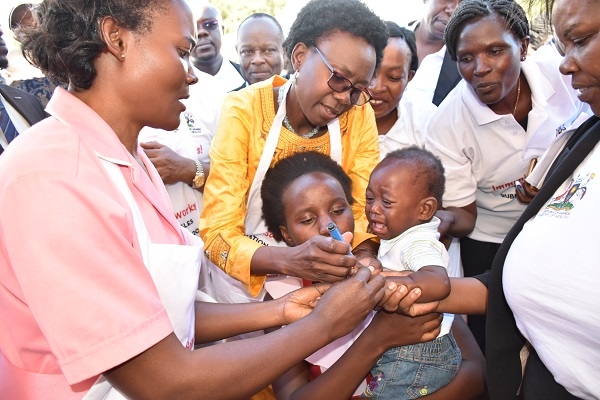More than 19.4 million children under the age of 15 were vaccinated against measles and rubella in last month’s national immunisation campaign.
The health ministry initially targeted 18 million children, meaning it achieved 108% success.
The ministry also vaccinated 7.9 million children against polio out of the 8.2 million targets, representing 97%.
“As a result of this mass immunisation campaign, most of our isolation wards have since returned to their measles-free status. We have also observed a 71% reduction in the number of clinically suspected cases through our weekly surveillance reports,” the health minister, Dr Jane Ruth Aceng, said.
Reduced cases of measles
Nearly a month after the mass exercise, the ministry has registered only 212 suspected measles and rubella cases as compared to 733 cases that were registered in April.
Regarding laboratory-based surveillance, the minister said about 45% of the suspected measles cases turned out to be non-specific skin conditions.
The Uganda National Expanded Programme on Immunisation also received 90 reports of adverse effects, the majority of which were minor (77) and have since resolved spontaneously.
Two hospitalised
Aceng said the ministry had registered two serious cases of children who are currently hospitalised after suffering serious skin problems.
There was also a case of a child who died last week, after obtaining the vaccine. The minister, however, did not attribute these cases to vaccination, saying samples had been taken to the Uganda Virus Research Institute for further investigation.
“Like any other pharmaceutical products, measles and rubella vaccines have side effects. However, they do not affect everybody and the side effects are minor and temporary,” she said.
According to medics, the common minor side effects may include soreness, redness, or rash at the injection site, fever or swelling of the glands in the cheeks or neck.
Serious side effects, although rare, may include bleeding disorders and other hypersensitivity reactions.
Paediatrician’s report
Dr Deo Munube, the president of Uganda Paediatric Association, said a child diagnosed with cancer or severe HIV is exempted from immunisation.
“Children with cancer and severe HIV have “an immune-compromised state”.
This means that if they get an infection, the body is not able to fight it,” he said. Munube said certain vaccines like that of measles and rubella, have live vaccines.
This means that a small amount of the measles virus that causes infections is introduced into the body. Once the body recognises that what has been introduced is bad, it develops immunity against the infection.
However, the bodies of cancer patients cannot fight any form of infection and giving them the dose could lead to death.
Munube said children with cancer and severe HIV are protected against diseases such as measles, rubella and other infections through hard immunity.
“Hard immunity is when you vaccinate 95 out of 100 people who then provide protection to the remaining 5%,” he said.
The health ministry implemented the vaccination campaign in response to measles and rubella outbreaks in which 300,000 suspected cases were reported, 46,000 patients admitted with symptoms of the diseases and 586 related deaths recorded within the three year period of the outbreak
